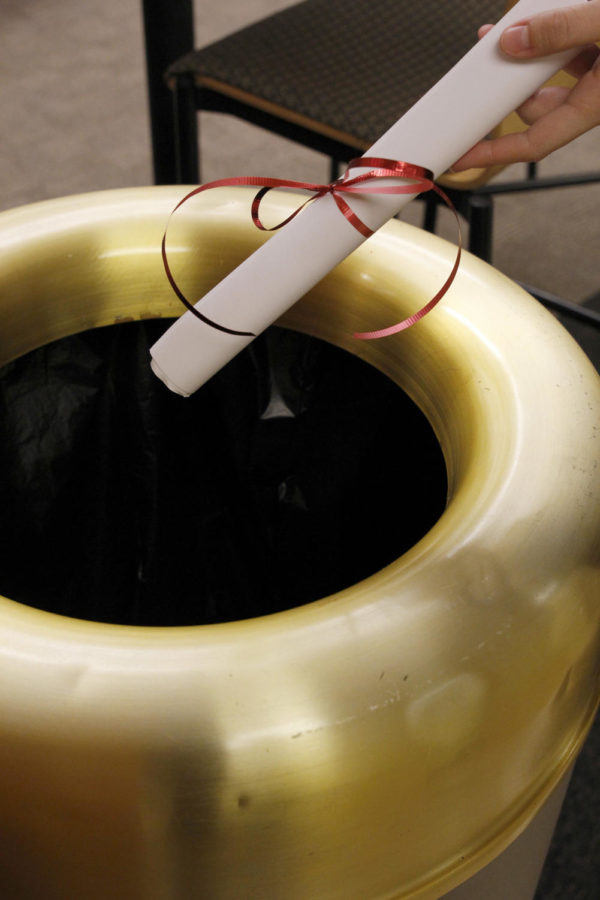Gross: Abolish zero-tolerance policies
Jonathan Krueger/Iowa State Daily
Zero-tolerance discipline policies can not only be detrimental to students by putting them behind with classwork but also discourage some students from continuing their education.
December 4, 2013
Time and time again it has been proven that it is more effective to reinforce good behavior with rewards than to teach better behavior by punishing mistakes. Since the appearance of operant conditioning in psychological fields, scholars have argued that positive reinforcement is a more effective tool in shaping human and animal behavior than is punishment — whether it is at home, school or the workplace.
This is not to say that punishment has no place in behavior conditioning. Without punishment, children may grow to think that poor actions or mistakes have no negative consequences, which can be just as dangerous as being punished too frequently or fearing consequence at every turn. However, as in most things in life, it must be used in moderation. Looking at the case of any abused or neglected child can show you the dangers of over-punishment.
Despite this, school districts around the country continue to use harsh zero-tolerance policies for student misbehavior. This means that students who are caught underage drinking, possessing drugs, or otherwise breaking the law are most likely met with harsh punishment: suspension, expulsion, and even arrest at times. At such a critically young age in their lives, these students are being treated as fully-fledged adults, which not only results in excess punishment but also in losing the opportunity for proper behavior to be learned.
This accompanies the idea that hard conditioning will eradicate the bad behavior of a child, like a dog swatted for peeing on the carpet. However, these methods rarely work, and reports of zero-tolerance policy failures are growing each year. The New York Times reports that these “get-tough” policies are resulting in increased arrests and drop-outs, rather than the other way around.
Perhaps some may see it as “punishment” for a student to be suspended for a week or two. However, without making sweeping generalities it can safely be said that children who are suspended are not often the type to be fussed over a for few missed classes. What results is then not punishment at all, but a delaying of educational process.
As a result of those precious missed weeks, a student who misbehaved or broke the law will fall behind in their classwork. Any motivation they had to do well in class will evaporate when it becomes difficult just to catch up with the rest of the class.
That effect is only increased if a student is kicked out of a school. Without being tied to that institution, it is up to potentially lax parents or oblivious authorities to make that student restart their education at a different school. Of course, schools want to flush their systems of bad students and social deviants, but schools are not meant to be pinnacles of societal balance and peace — they are institutions of education. Many argue that it is the parents’, not the schools’, duty to morally educate a child but in a situation where parents are unwilling or unable, whose job is it?
Under the Obama administration, the Departments of Justice and Education respectively have worked to keep children in schools, and discourage schools from expelling students who commit minor mistakes. With federal attention, perhaps the problem will eventually be assuaged, but it isn’t something the public can ignore in the meantime.
Young people who commit one tiny error — going to the wrong party, making a bad split-decision, making the wrong friends in a new district — can have their futures taken away from them. By suspending or expelling students, schools can indirectly cause students to lose their diploma by making it hard for that student to continue their education, or hard to even want to do so.
Additionally, keeping students out of sports, dances or other school functions may seem like a good punishment for poor behavior, but these actions isolate children and sometimes, encourage them to turn to other, less beneficial forms of recreation. With the options of school sports, clubs, dances or other after-school groups, it is easier for a child to fall into less legal or socially accepted habits.
Think back to the mistakes we made in high school, or our friends made, or even other classmates that we didn’t know too well. Is it fair for those kids to have their future taken away from them? If you or your friends were caught and punished for every bad thing you did, would you still be where you are today?
It’s time to rethink the zero-tolerance policies, and give our children a second chance.

















